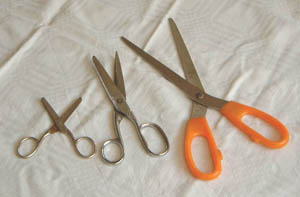Scissors facts for kids
Scissors are a tool used for cutting thin material like:
Knives are better than scissors for some uses. Unlike a knife, scissors have two sharp edges. Some types of scissors, like children's scissors, are not very sharp. Children's scissors are often protected with plastic. These are called "Safety Scissors".
Scissors can be made for left-handed or right-handed people. Using scissors made for the wrong hand is very hard for most people.
There are many kinds of scissors used for cutting different materials and shapes.
Contents
Specialized scissors
Among specialized scissors and shears used for different purposes are:
Gardening, agriculture and animal husbandry
| Type | Image | Description/purpose |
|---|---|---|
| Hedge trimmers | 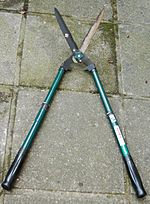 |
for trimming hedges |
| Grass shears |  |
for trimming grass |
| Averruncators | 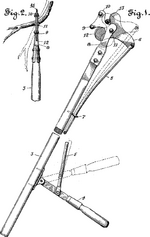 |
for trimming high branches |
| Pruning shears or secateurs | 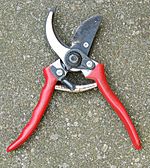 |
for trimming small branches |
| Loppers |  |
for cutting through large branches |
| Blade shears |  |
for cutting an animal's fleece to harvest wool |
Food and drug
| Type | Image | Description/purpose |
|---|---|---|
| Kitchen scissors or kitchen shears |  |
For food preparation, but often used for a variety of other purposes. Today, kitchen scissors are usually made from stainless steel for food hygiene and oxidization-resistance reasons. They often have kitchen functionality (other than cutting) incorporated, such as bottle-cap, to fish scale, to crack nuts and bottle-openers built into the handles. |
| Poultry shears | to cut poultry | |
| Cigar cutter |  |
specialized scissors with concave blade edges to cut cigars |
Grooming
| Type | Image | Description/purpose |
|---|---|---|
| Hair-cutting shears | 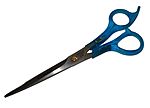 |
for trimming hair |
| Thinning shears | 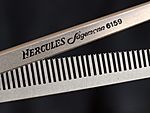 |
for thinning thick hair to avoid a bushy look |
| Hair clippers | 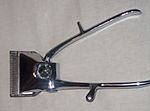 |
for cutting hair by barbers, hairdressers, and pet groomers |
| Nail scissors |  |
for cutting finger- and toenails |
| Moustache scissors | for trimming moustaches | |
| Nose scissors | small scissors for nostril hair, blunt-ended to protect the sensitive interior of the nose |
Metalwork
| Type | Image | Description/purpose |
|---|---|---|
| Snips |  |
for cutting through sheet metal. |
| Tin, or tinner, snips | ||
| Compound action snips | ||
| Pipe and duct snips | ||
| Hydraulic cutters | 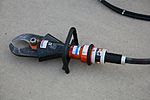 |
for cutting heavy sheet metal, often in traffic collisions. Sometimes referred to by the genericized trademark "Jaws of Life". |
| Throatless shears | 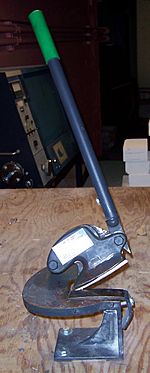 |
for cutting complex shapes in sheet metal |
Medical
| Type | Image | Description/purpose |
|---|---|---|
| Trauma shears, or "tuff cuts" |  |
for use in emergency medical response and rescue should it be necessary to cut off clothing. The rounded tips are designed to slide across the patient's skin without causing injury. |
| Dissection scissors | for cutting flesh in dissection | |
| Surgical scissors | 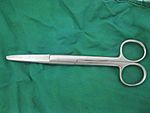 |
for cutting flesh in surgery |
| Iris scissors | for ophthalmic surgery | |
| Metzenbaum scissors | for delicate surgery | |
| Tenotomy scissors | for delicate surgery | |
| Mayo scissors | often for cutting fascia | |
| Bandage scissors | for cutting bandages |
Ceremonial
| Type | Image | Description/purpose |
|---|---|---|
| Ceremonial scissors |  |
giant scissors used for ceremonial ribbon-cutting events |
Sewing and clothes-making
| Type | Image | Description/purpose |
|---|---|---|
| All purpose, or Crafting scissors |  |
With long blades and pointy tips, designed to cut long, straight, smooth cuts in a variety of materials, as well as to get into small areas with the tips. In sewing applications they are primarily used for non-fabric cutting applications, such as cutting out paper patterns. |
| Applique scissors | An offset handle and paddle-shaped blade pushes away the bottom layer of fabric for controlled cuts close the stitching. Designed to cut/trim close to the fabric while protecting it from damage, and used for applique work and rug making. | |
| Button hole scissors |  |
Adjustable, short-bladed, heavy-duty scissors for opening button holes. |
| Dress-makers shears | Dressmaker's shears have a long blade (typically 7–10"), to facilitate cutting out fabric. Blades are tapered, with one pointed and one rounded tip; the blunt tip prevents fabric from snagging on seams and threads. Blades have a "knife edge": the top blade is set at an acute angle which allows them to cut through fabric easier than scissors. More heavy-duty than general scissors, the bottom blade sits flush on the table- making it easier to cut accurately through fabric. | |
| Embroidery snips | Small scissors without loopholes for the fingers, which have a fine pointy tip, designed to get close to the fabric without damaging it. These snips feature a curved blade, to facilitate getting as close as possible to the base of a thread without damaging the garment. | |
| Pinking shears |  |
for cutting cloth and producing a serrated edge so that the fabric does not fray. |
| Sewing chatelaine scissors | Chatelaine is a French term meaning "mistress of a castle, chateau or stately home", and dates back to the Middle Ages. It refers to an ornamental clasp or hook from which chains were hung from the waist, holding perhaps, a purse, watch, keys, scissors or thimble case. The sewing chatelaine became a popular ornamental appendage worn by Victorian ladies at their waist, but disappeared when fashion changed and skirts were no longer full and long. Sewing chatelaines are now produced and worn as pendants around the neck. | |
| Tailor's scissors |  |
Designed to cut through heavy-duty materials like leather or multiple layers of fabric. Generally shorter in length (5″ blades are typical), with thicker blades that feature precision-ground knife-edges which cut all the way to the tip. |
Images for kids
-
Han dynasty scissors
-
Chinese scissors, early to mid-Tang dynasty
-
A pair of iron scissors dating from the Han Dynasty
-
embroidery scissors in the form of a crane
See also
 In Spanish: Tijera para niños
In Spanish: Tijera para niños


